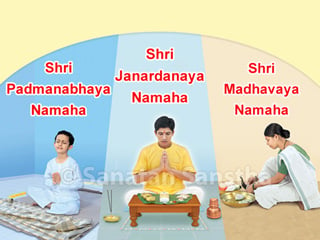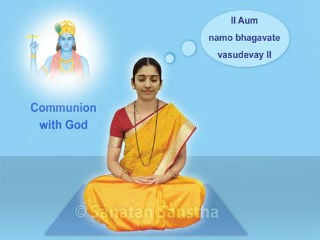Contents [hide]
- 1. Benefits of chanting according to psychology
- 1.1 As a therapy in psychiatric illnesses
- 1.2 Introversion and introspection
- 1.3 Developing a liking for chanting and purification of the subconscious mind
- 1.4 Reduction of impressions in the intellect centre as well as the subconscious mind
- 1.5 Increase in concentration
- 1.6 The benefits are similar to those obtained in silence (moun)
- 1.7 The physical benefits resulting from tranquility of the mind
- 2. Benefits of chanting according to the science of Spirituality
- 2.1 As a therapy
- 2.2 The worldly (sakam) and non-worldly (nishkam) motives
- 2.3 The perfect spiritual practice
- 2.4 Purification of speech
- 2.5 Internal purification
- 2.6 Development of an introverted attitude
- 2.7 Development of devotion and faith
- 2.8 Appeasement of the deities
- 2.9 Chanting with and without worldly expectation and merits and sins
- 2.10 A non-action (akarma karma)
- 2.11 Overcoming destiny
- 2.12 Acquisition of supernatural powers (siddhis)
- 2.13 Dissolution of the ego
- 2.14 Achieving non-duality (advait)
- 2.15 Benefits even after death

1. Benefits of chanting according to psychology
An individual is composed of two parts, the physical body and the subtle body. The physical body is what is usually referred to as the body. The subtle body is composed of nineteen constituents namely – the five subtle sense organs, the five subtle motor organs, the five vital energies (pranas), the conscious mind, the subconscious mind, the intellect and the ego [embodied soul (jiva)]. The five vital energies provide energy for the functioning of all these components. The subconscious mind contains various centres like the identification and interpretation centre, the give and take account centre, the desire and instinct centre, the like and dislike centre, the temperamental characteristic centre, etc.
1.1 As a therapy in psychiatric illnesses
Chanting proves to be beneficial in a majority of psychiatric illnesses. Chanting The Lord’s Name is perhaps one of the most effective modes of therapy in the treatment of ‘obsessive compulsive neurosis’.
1.2 Introversion and introspection
‘Introversion and introspection are both quite necessary for the development of positive qualities within oneself. The process of chanting favourably facilitates the development of both these factors. Chanting in the true sense is not really possible without becoming introverted. If one wishes to observe whether chanting is going on in the mind, it is essential to become introverted. The mind which wanders due to its inherent tendency does not concentrate on chanting for long. Once this is realised it has to be brought back to chanting. In this process of turning it back one becomes aware of the thoughts or defects which prompted the mind to wander. This itself is introspection.
1.3 Developing a liking for chanting and purification of the subconscious mind
According to psychology, chanting The Lord’s Name and that of a worldly object are both quite similar. When a mother utters or hears her son’s name several emotions such as motherly affection, happiness, worry, aspirations, etc. are generated in her subconscious mind. This is because all emotions associated with the name of the object, that is the son, coexist with it. The memory or hearing of that name, constantly activates them. One does not require effort to remember one’s son. It occurs automatically and constantly and becomes a powerful driving force of her life. Sometimes due to this very force a mother is prepared to sacrifice everything for her son. The psychological response in chanting The Lord’s Name too, is the same. Some emotion or image about The Lord is consciously or unconsciously present in the person chanting His Name. One also has some notion about His qualities. One knows from discussions that one is benefitted by The Lord’s grace and that chanting His Name is the tool to acquire it. Hence, the spiritual emotion (bhav) that one is chanting the Name of the One who has particular qualities accompanies the Name. Due to this very spiritual emotion, emotions such as respect, love and devotion for God, fear of wrong actions, etc. go on increasing progressively while emotions to the contrary go on diminishing. Thus gradual purification of the subconscious mind is achieved.’ (1)
1.4 Reduction of impressions in the intellect centre as well as the subconscious mind
 |
1.4 A. Absence of development of new impressions: As long as chanting is going on it prevents the development of new impressions about other things on the subconscious mind. Chanting The Lord’s Name is perhaps the best way in the wakeful state to prevent the occurrence of new impressions in the subconscious mind. [In the states of concentration (dharana), meditation (dhyan) and the superconscious state (samadhi) too, impressions about other things are not created on the subconscious mind.]
1.4 B. Reduction of existing impressions: When chanting is going on, the conscious mind does not accept the impulses coming from the centres of the subconscious mind like the desire and instinct centre, the like and dislike centre, the temperamental characteristic and the intellect centre. When this continues for long, gradually the impressions in these centres start decreasing.
1.5 Increase in concentration
As the impressions in the centres of the subconscious mind reduce, the impulses coming to the conscious mind from the subconscious also reduce. This aids the development of better concentration.
1.6 The benefits are similar to those obtained in silence (moun)
Chanting The Lord’s Name is a type of silence (moun). Hence, the psychological benefits of observing silence as given below, also occur with chanting.
1.6 A. Reduction in worldly problems: Most worldly problems arise from speaking. With practice of silence, they are naturally averted.
1.6 B. One can avoid telling lies.
1.6 C. Control over the six foes (shadripu): When emotions like anger, etc. are not expressed one can gradually gain control over them.
1.7 The physical benefits resulting from tranquility of the mind
When the mind remains peaceful with chanting, one is free from psychosomatic illnesses precipitated by stress and enjoys good health.
2. Benefits of chanting according to the science of Spirituality
2.1 As a therapy
If one has problems due to spiritual factors then chanting The Lord’s Name is useful as a spiritual remedy. For example, if an individual has a deficiency of vital energy (pranshakti) then chanting the Name of a superior deity like Shiva, Vishnu or Ganapati is recommended. Similarly, if one has problems due to ancestors’ subtle bodies then the Name of Lord Datta is advocated.
Now, to understand the relationship between the organs and the deities, do an experiment. First chant the word ‘Arka’ for a minute and note in which sense organs namely, the ears, skin, eyes, tongue and nose some sensation is felt. Only then read the following paragraph.
Thirty-one seekers attended a workshop on Spirituality. None of them knew the meaning of the word Arka. After chanting the word ‘Arka’ they experienced sensations in the various sense organs as follows: 19 seekers – in the eyes, 4 – in the ears, 4 – in the tongue, 3 – in the nose and 1 – on the skin. From this, one can deduce that there exists some relationship between the word Arka and the eyes. Arka is one of the Names of Surya (Sun deity). The Sun deity and the eyes both being associated with the tej (absolute fire) element, after chanting Arka, a majority of seekers felt the sensation in the eyes.
The average spiritual level of the seekers was 35%. At a satsang (spiritual meeting), at times the spiritual level of seekers can rise upto 40-50%. [The spiritual level of an average individual is 20% while that of one who has attained the Final Liberation (Moksha) is 100%.] If individuals with a spiritual level of 20% perform this experiment they are not able to perceive anything. Hence when performing such experiments everyone does not get spiritual experiences. Only those who have attained a spiritual level of more than 35% through spiritual practice and are able to perceive something in the subtle dimension obtain some spiritual experiences.
The following table illustrates the relationship of various organs to deities and also how the Name of a particular deity should be chanted to improve the function of a particular organ. The point to be noted here is that the specific chanting will be beneficial only if the function of an organ is impaired due to a spiritual factor, that is a reduction of vital energy (pranshakti) and not if the cause is physical or psychological.
| The organ | The mantra of the deity | |
|---|---|---|
| A. | ‘The sense organs | |
| 1. The ears | Om Dikdevatabhyo Namaha | |
| 2. The skin | Om Samiranaya Namaha | |
| 3. The eyes | Om Arkaya Namaha | |
| 4. The tongue | Om Varunaya Namaha | |
| 5. The nose | Om Ashvinikumarabhyam Namaha | |
| B. | The motor organs | |
| 1. The organs of speech | Om Agnaye Namaha | |
| 2. The hands | Om Indraya Namaha | |
| 3. The legs | Om Upendraya Namaha | |
| 4. The anus | Om Yamaya Namaha | |
| 5. The sex organs | Om Prajapataye Namaha | |
| C. | The antahkaran | |
| 1. The conscious mind | Om Chandraya Namaha | |
| 2. The subconscious mind | Om Achyutaya Namaha | |
| 3. The intellect | Om Chaturmukhaya Namaha | |
| 4. The ego | Om Shankaraya Namaha’(2) |
2.2 The worldly (sakam) and non-worldly (nishkam) motives
Some deities can be chosen according to one’s desire as follows.
| The deity | The function |
|---|---|
| 1. The family deity (Kuladevata) | Materialistic and spiritual |
| 2. Dhanvantari, Ashvinikumar, Surya |
Physical and mental health |
| 3. Parvati | Marriage, marital happiness, food |
| 4. Kamadev | Sexual pleasure |
| 5. Prajapati | Progeny |
| 6. Lakshmi, Kuber, Agni | Money, wealth |
| 7. Indra | Power |
| 8. Vishvakarma | Architecture |
| 9. Chitrasen | Music |
| 10. Nataraj | Dance |
| 11. Sarasvati, Ganapati, Mahadev | Numbers, letters, intellect |
| 12. Janardan | The Final Liberation (Moksha) |
2.3 The perfect spiritual practice
The complete spiritual practice is one that is compatible with the functioning of the body and the mind. Chanting The Lord’s Name is one such perfect spiritual practice. Hence, it is an excellent means of going towards the natural state of communion with God (sahajavastha).
To follow the Path of Knowledge one requires sharp intellect but ‘All the four classes can chant.There is none too small or great to do chanting. Even the weak and the downtrodden are able to overcome the Great Illusion with the help of The Lord’s Name’. – Shri Dasbodh (4.3.24)
2.4 Purification of speech
‘Worldly talk diverts the speech from purification of the subconscious mind and makes it impure. To bring about its purification one should chant The Lord’s Name.’ – Saint Bhaktaraj
2.5 Internal purification
2.5 A. ‘Just as the sun destroys excreta as well as its odour, the radiance generated from chanting The Lord’s Name destroys the internal impurities.’ – Saint Bhaktaraj
2.5 B. Tukaram Maharaj has said, ‘Chanting The Lord’s Name is a very easy means of incinerating the sins of several births’. H.H. Bhaktaraj Maharaj too always said the same, ‘Rama’s Name is mightier than Rama Himself’. Thus chanting The Lord’s Name not only destroys the accounts of past actions but if done continuously, purifies man’s antahkaran and makes it potent, to receive spiritual knowledge. Just as one cannot reap a good harvest without ploughing the field to make it fertile, so also, knowledge does not penetrate the antahkaran until it is purified. Hence, it is essential to remain steadfast unto the practice of action (karma), devotion (bhakti), worship of The Lord, singing devotional songs (bhajans, kirtans), etc.’ (3)
2.5 C. अज्ञानादथवा ज्ञानादुत्तमश्लोकनाम यत् ।
संकीर्तितमघं पुंसो दहेदेधो यथानल: ।। – श्रीमद्भागवत ६.२.१८ The meaning: Just as fire chars wooden logs irrespective of whether they are deliberately or accidently thrown into it, so also if one utters The Lord’s Name either intentionally understanding it or unintentionally, it cleanses man of his sins.
2.6 Development of an introverted attitude
This reduces the attachment to external objects.
2.7 Development of devotion and faith
The spiritual experiences that one gets from chanting, generate and strengthen devotion and faith.
2.8 Appeasement of the deities
When one chants the Name of a deity, it gets appeased. Just as in worldly life if one remains in constant touch with someone he does not forget us, so also by chanting His Name if one remains in contact with The Lord then He too remembers us.
The Shrimadbhagvadgita (9:22) quotes the following secret of devotion.
अनन्याश्चिन्तयन्तो मां ये जना: पर्युपासते ।
तेषां नित्याभियुक्तानां योगक्षेमं वहाम्यहम् ।।
It means, ‘I take care of the worldly requirements of those who worship Me with devotion’. One remains engrossed in The Lord’s Name and He looks after one’s worldly and spiritual needs. This itself is called Rajayoga. No matter what anyone may say I term this itself as Rajayoga (the king of Yogas). In Shri Gurucharitra, the title ‘the rich one’ is bestowed by saints upon one who chants The Lord’s Name. Hence, the truly wealthy one is the one chanting The Lord’s Name.’ – H. H. Kane Maharaj
‘Chanting The Lord’s Name is one’s duty. One should chant with every breath to repay the debt to The Lord who has created us.’ – Saint Bhaktaraj
2.9 Chanting with and without worldly expectation and merits and sins
2.9 A. Since chanting The Lord’s Name with worldly expectation (sakam) is a good action, one acquires merits from it.
2.9 B. Just chant the Name of Hari, then the merits obtained are beyond measure! – Shri Dnyaneshvar Haripath [abhang (hymn) number one]
2.9 C. Chanting The Lord’s Name without expectation (nishkam) amounts to pure merits and with expectation to impure merits.
2.9 D. Heaven is acquired by meritorious sins. One acquires hell by sinful sins. God is attained only by pure merits, that is by devotion without expectation (nishkam). – Shri Bhavarthadipika (Shri Dnyaneshvari) 9:316 The meaning: Heaven is attained by meritorious sins. [Since attaining heaven is not the motive of a seeker, the merits granting heaven are also termed as meritorious sins. The seeker’s aim is attaining the Final Liberation (Moksha).] With sinful sins one attains hell. Only with pure merits, that is devotion without worldly expectation (nishkam bhakti) am I (The Lord) attained.
2.9 E. Chanting with expectation fulfills one’s worldly expectations or bestows the grace of that particular deity. But chanting without expectation unites the seeker directly with the Brahman principle or God Himself.
2.9 F. ‘Sins committed unknowingly are nullified by chanting. However those committed deliberately are not.’ (Manusmruti 11.46)
2.9 G. The Lord’s Name – the annihilator of all sins: The Lord’s Name has the inherent power of annihilating all sins and fulfilling all desires. Since the very nature of the Name is that of Brahman or The Lord, it acquires this power. The Lord’s Name is the true illusion (anadhyasta vivarta) of The Supreme God. Perceiving a snake instead of a rope on the main object due to illusory forces is termed as illusion (vivarta). Perception of an object of a different nature (vijatiya) with cessation of knowledge of the main object is termed as false illusion (adhyasta vivarta) whereas perception of another object in place of the main object without cessation of knowledge of the same is termed as true illusion (anadhyasta vivarta). The illusion of ornaments in place of gold is a true illusion. Here there is no cessation of knowledge of gold yet one sees the ornaments. The incarnations (manifest forms) of The Supreme God are true illusions since in them, alongwith the knowledge of The Supreme Brahman one perceives the form of the incarnation. In the same way the Names of The Lord are true illusions of Brahman. The Names of The Lord are not distinct from The Lord Himself. They are one and the same. This is the description of ‘Namabrahman’ given by Saint Shri Gulabarao Maharaj.
2.9 H. The Lord’s Name is superior to the Vedas in nullifying sins: Scholars studying the Vedas are bound by behavioural restrictions. One studying the Vedas without following the code of conduct is not uplifted by the Vedas. ‘आचारहीनं न पुनन्ति वेदा: ।’ a quote also emphasises the same. It says, that the unrighteous are not uplifted by the Vedas. But The Lord’s Name has the potential to elevate even the immoral. Thus chanting The Lord’s Name can elevate not only the students of the Vedas but also others, not so qualified.’ (4)Even though sins are erased by chanting if they are generated continuously then it will be difficult to do chanting in the quantity required to destroy them. As a result, one will digress and fail to make spiritual progress, the main aim of chanting The Lord’s Name.
2.10 A non-action (akarma karma)
In any transaction despite meticulous efforts to minimize the ‘give and take account’, it is nearly impossible to conduct an accurate exchange. In short, a give and take account always persists. To avoid this it is essential that a non-action should take place.
Any action performed whilst chanting The Lord’s Name becomes a non-action (akarma karma), that is becomes devoid of a result. Thus one neither attains merits nor sins from it. Because of this action no new accumulated account (sanchit karma) is created. Consequently one finishes experiencing one’s destiny and liberation from the cycle of birth and death is hastened. On an average if one considers the accumulated account (sanchit karma) to consist of 100 units, then in one birth 6 units of these are experienced as destiny (prarabdha). Thus a man should attain Liberation in 16-17 births. But this does not happen as while undergoing those 6 units of destiny usually an average person does not chant The Lord’s Name or do any other spiritual practice. Besides due to wilful actions (kriyaman) the accumulated account increases by 10 units. Thus at the time of death the accumulated account becomes 104 units and one gets entangled in the cycle of birth and death. That is why a non-action should occur. Chanting of The Lord’s Name is one of the best means to achieve that end.
2.11 Overcoming destiny
2.11 A. No spiritual practice other than chanting The Lord’s Name can overcome destiny as all of them are in accordance with destiny. Chanting the Name however successfully overcomes destiny.
2.11 B. If one chants The Lord’s Name all the time, destiny becomes tolerable and its severity reduces considerably.
2.11 C. Destiny gets depleted by the act of chanting.
2.12 Acquisition of supernatural powers (siddhis)
The practice of specific chanting enables one to acquire control over a particular element and accordingly some supernatural powers, for instance chanting of ‘Surya’ (the Sun deity) bestows control over the tej (absolute fire) element and subsequently one is not affected by heat.
2.13 Dissolution of the ego
‘Once one is adopted, in order to inherit the property of the foster parents, one has to forget one’s old name and replace it with a new one. Similarly, to acquire God’s grace one needs to forsake one’s ego and forgetting one’s own name, one has to replace it with His, (that is chant His Name). Thus, a seeker should get engrossed in chanting The Lord’s Name forgetting oneself and should blend with His Name.’ – Saint Bhaktaraj
2.14 Achieving non-duality (advait)
As one chants The Lord’s Name, one blends with it. The Lord’s Name and the one chanting it get unified. Once the one chanting the Name, the deity whose Name is being chanted and the act of chanting merge, that is their triad is destroyed, the state of non-duality (advait) is attained.
2.15 Benefits even after death
‘The Lord’s Name is the most subtle of all objects in the gross dimension. “It” accompanies the subtle body at the time of death on its onward journey. For the seeker chanting The Lord’s Name there is no death but only union with The Lord’s Name. As the seeker keeps chanting, this is what eventually happens.’ – Saint Bhaktaraj
Reference:
‘Path of Chanting The Lord’s Name (Namasankirtanyoga) and Path of Mantra (Mantrayoga)’, published by Sanatan Sanstha.
Bharatiya Sanskrutikosh. Publishers: Pandit Mahadevshastri Joshi, Secretary, Bharatiya Sanskrutikosh Mandal, 410 Shanivar Peth, Pune 411 030.
Vol. 1 and 2: Second edition Vol. 3 to 10: First edition
1. Vol. 5, Pg. 36, 37
4. Vol. 5, Pg. 34, 35
2. Shri 108 Dnyangir Maharaj Yanche Charitra. Author: Shri Bhaktaraj Maharaj, Indore. 1st edition 1966. Publisher: Shri Dinanath Sadashiv Sonone, Shri 108 Mahantaji Gyangir Maharaj Charitra Prakashan Mandal, Sion, Mumbai-22.
3. The Vedantasar of Sadanand, Edn. 1934. Edited by Colonel G. A. Jacob. Publisher: Pandurang Javaji, Nirnay Sagar Press, Mumbai 400002.

 Why do we chant Name of Kuladevi instead of Kuladev?
Why do we chant Name of Kuladevi instead of Kuladev? Guidance by His Holiness Bhagwantkumar Menrai on how to coordinate chanting the Name of God...
Guidance by His Holiness Bhagwantkumar Menrai on how to coordinate chanting the Name of God... How different chants can help avoid unfavourable incidents ?
How different chants can help avoid unfavourable incidents ? How chanting purifies the mind ?
How chanting purifies the mind ? How does chanting help us to achieve oneness with God?
How does chanting help us to achieve oneness with God? Spiritual benefits of chanting God’s Name
Spiritual benefits of chanting God’s Name